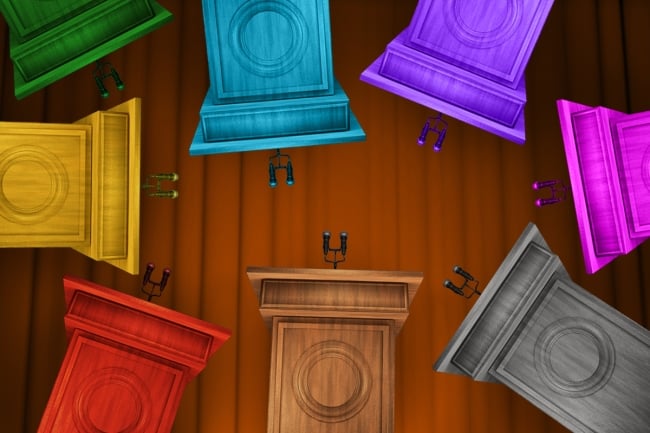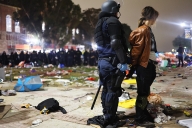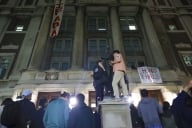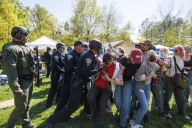You have /5 articles left.
Sign up for a free account or log in.

Traditional universities as well as entities that aren’t universities at all are involved in the free expression debate.
A Minnesota university that made national headlines for openly denouncing and then allegedly ousting an adjunct professor after one student’s complaints might seem an odd place to host an academic freedom forum.
But Hamline University’s conference last month had more to its title: “Academic Freedom and Cultural Perspectives—Challenges for Higher Ed Today and Tomorrow.” And outgoing president Fayneese Miller’s opening speech emphasized those “cultural perspectives” of “today.”
“How do we ensure that academic freedom, demographics and cultural perspectives are not at odds with each other, but complement each other?” Miller asked. She defended Hamline’s academic freedom record while simultaneously saying the event was “not a referendum on what did or did not happen at Hamline.” Its purpose, she said, was “not to correct the unsubstantiated comments that swirled around about Hamline.”
In an investigative report earlier this year, the American Association of University Professors said that Hamline rescinded its offer to adjunct professor Erika López Prater to teach last spring after López Prater showed global art students centuries-old paintings of the prophet Muhammad. The report said López Prater forewarned students that she would be displaying the images, but a Muslim student still complained; many, but not all, Muslims consider visual depictions of Muhammad sacrilege.
In a universitywide email, Hamline’s vice president for inclusive excellence called López Prater’s actions “Islamophobic,” and, in a December joint statement, Miller and that vice president said, “Respect for the observant Muslim students in that classroom should have superseded academic freedom,” according to the report. In January, Miller and her Board of Trustees chair released a new joint statement saying, “Our usage of the term ‘Islamophobic’” was “flawed,” and that it “was never our intent to suggest that academic freedom is of lower concern or value than our students—care does not ‘supersede’ academic freedom, the two coexist.”
AAUP’s report concluded, “The administration of Hamline University, including President Miller … encouraged and promoted, through email messages and other means, what amounted to a de facto campaign of vilification against professor López Prater that also represented an assault on fundamental principles of academic freedom.”
Miller—a spokesman said she wasn’t available for an interview Friday—seemed to take swipes during last month’s forum at the AAUP’s central statement on academic freedom and related job protections: its 1940 Statement of Principles on Academic Freedom and Tenure.
“Let’s think back to 1940, the year that the principles of academic freedom were first written,” Miller said. “Let me help you with that one: we were a segregated society and our institutions of learning, with a few exceptions, were segregated and homogeneous.” She noted that her private Minnesota university’s student body is more than 10 percent Muslim.
“Will you embrace academic freedom as your God-given right?” she asked the audience. “Or will you allow academic freedom to exist within a contextual framework and be nuanced?” Miller said “academic freedom is truly being threatened” in Florida, Texas and other places, but “it is not being threatened that way in Minnesota; it is not being threatened that way at Hamline University.”
Speakers included Michael Eric Dyson, Vanderbilt University’s Centennial Chair in African American and Diaspora Studies, who didn’t return a request for comment Friday. His speech seemed to offer faint support for how Hamline treated López Prater; Dyson referenced people “who, if they look upon certain images, will be punished in a religious orthodoxy for which you have no consciousness or conscience, because if you exercise your freedom of speech you place that person in vulnerable positions.”
Asked how much Dyson and other speakers were paid, a Hamline spokesman wrote in an email, “The event was paid for by a donor and all finances are private information.”
Tom Ginsburg, the University of Chicago’s Leo Spitz Professor of International Law, called the event Hamline’s “so-called academic freedom conference.” He said Hamline “doubled down” on defending its punishment of a faculty member who did nothing wrong, all because a student took offense, which would be “very dangerous for higher education in America if that approach is widely borrowed.”
“What’s left [to discuss] if you add up everything that everyone is offended about?” he said. “You can’t have a trump card of every individual’s subjective feeling.”
Chicago Style
Ginsburg’s university has made a brand out of free expression unfettered by current cultural perspectives. This past Thursday and Friday, Chicago held its first Forum on Free Inquiry and Expression, seeking to expand upon its influential, nearly decade-old campus free expression principles, called the Chicago principles or the Chicago statement. Ginsburg is the forum’s faculty director.
“We want to try some things out and try to deepen the conversations on our own campus, but then also push back against some of the forces of illiberalism and stand up for academic freedom more broadly,” he told Inside Higher Ed.
Appropriately enough, then, Friday morning’s first panel was dubbed “Rising Illiberalisms.” New York Times columnist David French highlighted a lack of tolerance from a different religion. “I think it’s been 13 years now since there’s been a significant religious liberty loss at the Supreme Court,” French said, “so right now in the United States of America, you, regardless of your faith, regardless of your point of view, have more freedom from government censorship of your speech, whether it’s secular or religious, than at any point in American history.
“And yet, you do not see large sections of the Christian community in the United States celebrating that victory. Instead there’s a rising anger, and there’s a rising anger at what? The expression of others,” he said. “It is very difficult to defend free speech in an atmosphere of extreme animosity.”
Suzanne Nossel, chief executive officer of PEN America, also discussed pressures on free speech from both sides of the political spectrum. She said she thinks that, on the left, there’s frustration at the persistence of discrimination despite discrimination being formally banned.
“I think one notion that has taken hold [on the left] is that sort of free speech is incompatible with DEI [diversity, equity and inclusion], to kind of oversimplify—that to really achieve an equitable and inclusive campus … some people, some viewpoints have to be silenced because those viewpoints can interfere with other people’s sense of belonging, of being able to articulate their own voice,” Nossel said.
The Foundation for Individual Rights and Expression says more than 100 other higher education institutions and/or their faculties have endorsed either the Chicago principles or something substantially similar. Hamline is not on the list.
“Because the university is committed to free and open inquiry in all matters, it guarantees all members of the university community the broadest possible latitude to speak, write, listen, challenge and learn,” those principles say.
“Concerns about civility and mutual respect can never be used as a justification for closing off discussion of ideas, however offensive or disagreeable,” they continue.
But even the Chicago statement doesn’t endorse absolute free expression. “The university may restrict expression that violates the law, that falsely defames a specific individual, that constitutes a genuine threat or harassment, that unjustifiably invades substantial privacy or confidentiality interests, or that is otherwise directly incompatible with the functioning of the university,” the principles say.
A university “may reasonably regulate the time, place, and manner of expression to ensure that it does not disrupt the ordinary activities of the university,” according to the principles, and protesters “may not obstruct or otherwise interfere with the freedom of others to express views they reject or even loathe.”
But adopting principles isn’t the same as applying them. Ginsburg said Chicago will have a conference next year on how universities have implemented the principles, how they should put them into practice and whether the principles are out of date.
“We always have to question ourselves, and can they be improved?” Ginsburg said.
Uncancel Culture
Accredited universities continue to grapple with how to enable free speech and academic freedom on diverse campuses amid a national culture war. But, especially online, aspirational universities and nonuniversities can circumvent traditional institutions to provide platforms for free expression.
Heterodox Academy announced Thursday that it would host online a panel the American Anthropological Association canceled last month. Heterodox, a nonprofit, was established around the same time as the Chicago principles emerged and, in combating what it calls scholarly “orthodoxy,” has platformed academics who say their views have been suppressed.
So now five scholars will, after all, discuss the roles of sex and gender in anthropology. The anthropological association said the panel in question would’ve promoted transphobia and bad science.
“De-platforming distinguished scholars for having ‘harmful’ ideas about their own fields of expertise is a political action, not one of an academic society,” John Tomasi, Heterodox’s president, said in a news release. “Heterodox Academy is proud to offer another way for these papers to be heard and judged on their own merits.”
That panel will occur next month, which is also when Jordan Peterson, the controversial University of Toronto professor emeritus who denounces so-called woke ideology, says he’s launching the online Peterson Academy.
Peterson, who didn’t return requests for comment Friday, has given diverging descriptions in Instagram videos of how the academy will be set up. In February, he said he had 30 professors already on board and would pursue accreditation and offer online bachelor’s degrees. But in another video last week, he said, “I think we can just skip the accreditation process and go right to the employers.”
“Learn from the world’s best: How to think, not what to think,” says the academy’s sparse website.
Last year, Peterson said he retired from his tenured position at Toronto over concerns about higher education’s embrace of DEI and about his students—including his belief that his qualified straight, white, male graduate students had little chance of getting university research positions due to their sex and race.
“It would be funny if we could blow apart the university system a little bit because it’s broken because of what it did to you,” Peterson’s daughter tells him in one of the Instagram videos.
“Up yours, woke moralists; we’ll see who cancels who,” Peterson says.
Ginsburg said Heterodox and other free speech groups such as FIRE, PEN America and the American Civil Liberties Union are helpful for free expression. At the same time, he said, “there’s nothing like being an actual university, because when you’re an actual university, you actually confront all the myriad challenges and environments in which these free speech issues arise.”
Student free speech and faculty academic freedom clashed at Chicago last year, when a student with 30,000 Twitter followers publicly named and denounced a teaching fellow for a course called The Problem of Whiteness. The class was canceled and rescheduled for the spring. The Chicago principles, which are only about two pages long, don’t provide clear guidance on what a university should do in such a situation.
“Only a university really has to confront the entire range of problems with all of their complexity,” Ginsburg said.








